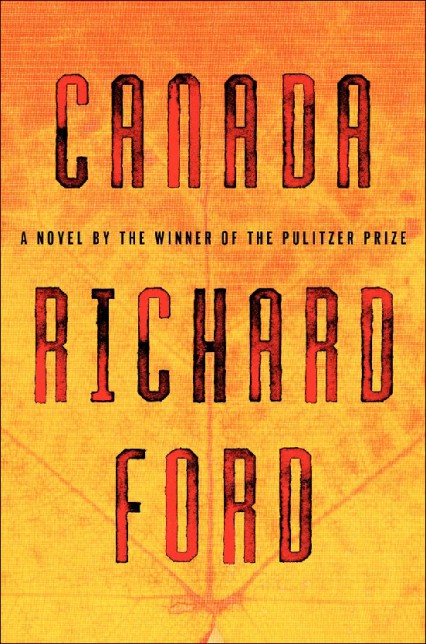James Lloyd examines Canada, the latest novel by acclaimed American novelist and short-story writer Richard Ford.

In the introduction to The New Granta Book of the American Short Story (2007), edited by Richard Ford, the author compares the opening of Tobias Wolff’s story, ‘Firelight’ (‘My mother swore we’d never live in a boarding house again, but circumstances did not allow her to keep this promise…’), with what he describes as the ‘brash and irresistible sentence’ that opens his own story, ‘Great Falls’ (‘This is not a happy story, I warn you’). Ford goes on to criticise his effort (‘I thought brash was good’) while praising Wolff’s ‘calmer, meditative’ opening for taking better ‘command of the reader’s attention’.
Richard Ford’s latest novel Canada begins in a similar fashion. ‘First, I’ll tell about the robbery our parents committed,’ reads the first sentence. ‘Then about the murders, which happened later.’ This is still a ‘brash and irresistible’ opening, but what follows is perhaps Ford recognising the need to apply the handbrake. ‘The robbery is the most important part since to set me and my sisters’ lives on the courses they eventually followed. Nothing would make complete sense without that being told first.’ Narrated by Dell Parsons, a sixty-five-year-old retired English teacher, it is this meditative tone, exhibited throughout the novel, which is its most significant achievement.
The story begins in the spring of 1960 with fifteen-year-old Dell living a backwater existence with his twin sister Berner, and parents, Bev and Neeva Parsons, in Great Falls, Montana. Neeva Parsons, the daughter of Polish-Jewish immigrants, is an aspiring poet who exacerbates her inherited cultural isolation by alienating both herself and her children from what she considers to be a ‘market town-mentality’. Their father, Capt. Beverly ‘Bev’ Parsons, ‘a tall, winning, smiling handsome six-footer’, has just left the Air Force and while struggling to hold down a job as a car dealer and then a realtor, renews a stolen beef scam that had tarnished his military career to make ends meet.
From the outset, Dell makes obvious the incongruity of his parents’ pairing, describing how his mother had gotten ‘unluckily pregnant’ after she’d met his father at a party.
Indeed, Canada is an examination of these and other consequences. For instance, when the beef scam goes awry for a second time that Bev hatches a plan to rob a bank. Following their imprisonment, Berner runs away from home and Dell is relocated to Canada. The examination of cause and effect is extended further when Dell wonders if the crime was the result of some ‘long-suppressed potential’, that his parents had become was they were always supposed to be.
Later Dell considers, ‘how ordinary behaviour exists so close beside its opposite’. In a sense, this observation can be seen to exemplify the era in which they live. For while the transition from the Fifties to the Sixties heralds advancements in medicine, politics and technology, things Bev Parson says will make his family’s lives better, he is blissfully unaware of any negative upshot, such as the nuclear threat and social revolution that would go on to defined the age.
Richard Ford began Canada in 1989, and returned to it three to four years ago, having stored the notes in his freezer, ‘in case the house burns down’. He admits it’s the longest he’d let one of his ideas brew and something he does not intend to do again. This lends itself well to the narrative itself. The slow, repetitious nature of the first part of Canada (the novel is in three parts) is like that of a story being thawed out, with the initial narrative hook of a robbery and murders creating an underlying insidiousness, which is augmented in the second part of the book when Dell becomes the virtual ward of Arthur Remlinger.
Dell, having had fifty years to reflect on these events, or as his mother puts it in a letter, a ‘thousand mornings to think about all this’, remembers the initial aftermath of the robbery with a tentative longing. Questions remain, of course, questions that he is not afraid to admit will remain unanswered, but it seems the ‘clear path to the path being cluttered’ must be walked. His approach is like that of a seasoned detective, making a note of each item as if trying to make reconstruct and taste once more the world he occupied, where he was happy with his study of both chess and beekeeping. ‘Everything in a hive was an orderly world’, says Dell.
The robbery creates a maelstrom around which the whole novel pivots and each scene is invested with items that represent the tragic flaws of each parent. Neeva cleans the house spotless, with her suitcase lying open, and Bev, first practising his eye exercises out in the garden and then taking out a jigsaw puzzle of Niagara Falls and swallowing one piece so that it remains unfinished.
The tension in the household is alleviated somewhat by Bev finally deciding to take Dell and Berner to the last day of the fair. The respite is temporary as they are followed by the police all the way there and anxiety finally gets the better of Bev. In an effort to lose them, he speeds up and turns onto a street which Dell declares to ‘nicer than ours…with more substantial elms and oaks and better-tended lawns and a redbrick school’. From here he can see the Zephyr and Ferris Wheel, the whirling and spinning symbolic of the growing sense of mistrust and inattention, with Dell finding stolen cash in the backseat, Berner crying, and Bev driving without looking where he is going.
Ford’s work has received categorisations in the past that have seen him pigeonholed. Adjectives such as ‘sinewy’ and ‘muscular’ have been commonly associated with his underrated debut novel, A Piece of My Heart (1976), and his classic short story collection, Rock Spring (1987) – although the style of each book is very different. However, these terms are unhelpful and betray the clarity and compassion achieved by a writer whose obvious graft in constructing his sentences is second-to-none.
Ernest Hemingway once wrote of John O’Hara’s novel, Appointment in Samarra, ‘If you want to read a book by a man who knows exactly what he is writing about and has written it marvellously well, read Appointment in Samarra.’ And this reader is in no doubt that Ford has achieved a similar feat with a novel that bears similarities to O’Hara’s. If anything the accomplishment is even more impressive as Ford pulls off the merging of two novels (which is essentially what the book is).
As already mentioned, he let Canada brew for twenty years before writing it, and much of the prose harks back to the matter-of-factness employed in his earlier works, which came to described by the dreaded euphemism ‘dirty realism’. Richard Ford has hinted in interviews and articles that his approach to writing is ‘blue collar’ (he has said he finds it hard to see writing as ‘work’). It is perhaps this overtly practical approach that is the most important aspects of Canada and of Ford’s work as a whole. For instance, in his short story, ‘Calling’, which has similar themes to Canada, Ford writes, ‘Few things in the world are actually mysterious. Most things have disappointing reasons behind them no matter how strange they seem at first’. Ford’s art is to de-mystify.
The Contemporary Fiction novel, Canada by Richard Ford is available now.
James Lloyd’s other contributions to Wales Arts Review is available here.











